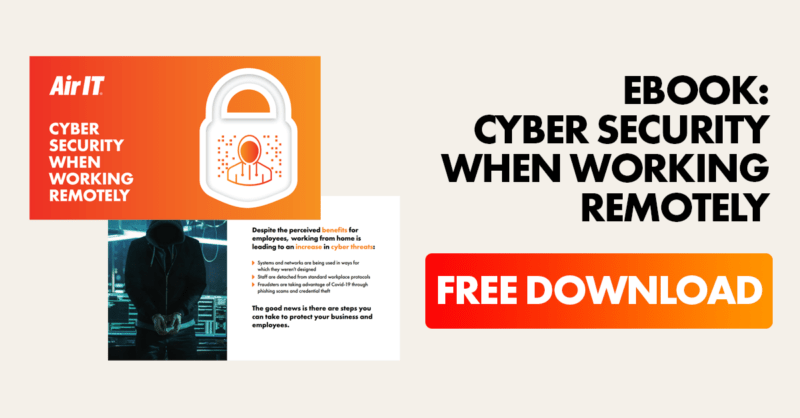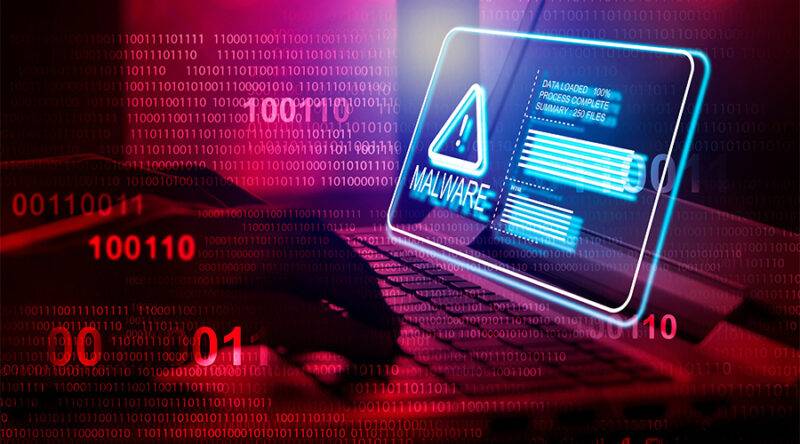The threat of cyberattacks is ever-increasing – here are our top cyber security tips for business owners and employees to stay vigilant.

Every 19 seconds in the UK, a small business is successfully hacked, according to research by Hiscox. The clear-up costs alone can be over £25,000 on average, not to mention the stress, data compromise and loss of customer trust that occur alongside.
The sudden, mass change to remote working when Covid-19 hit meant that businesses didn’t have much time to introduce an entirely new IT infrastructure. This means that IT systems and personal equipment are being used in ways they weren’t designed for, and are more vulnerable to cyberattacks. With remote working set to be the norm for the near future, and many businesses introducing permanent remote/hybrid working policies, organisations need to consider the increased security risk that comes with remote working.
So how can you protect your business? Here are some cyber security tips for business owners and IT professionals…
Top 6 cyber security tips for business owners and IT professionals
1. Conduct user awareness training
Employees are the ultimate line of defence against cybercrime, but they often fall below the mark. Using the same weak passwords across multiple accounts, clicking on suspicious links and falling for phishing emails are just some of the ways employees could inadvertently subject your business to cyberattacks.
In many cases, the pandemic has highlighted potential weaknesses in IT security – a recent survey reported that over half of UK businesses have found impersonation attempts harder to detect, and have been subject to more attempts of employee account hijacking.
Regardless of how much time, effort and money you put into your cyber security strategy, cybercriminals are relying on human error to gain access to your systems – and it often works.
Investing in your employees by providing user awareness training will ensure that they are up to date on best practice.
Not only that, but it will actively encourage a cyber security culture whereby staff are always alert and know how to spot suspicious activity.
2. Check the Dark Web for compromised credentials
You might assume that the Dark Web is something far removed from your business and you have nothing to worry about. However, your login details and other sensitive information may well be available on the Dark Web without you ever knowing.
The Dark Web holds a vast amount of email addresses, usernames and passwords that have been obtained in cyberattacks. Often, this is due to data breaches where companies inadvertently expose the details of their customers, or it is caused by people having weak passwords which are easily cracked.
So, many people never find out that their details have been stolen. They are then sold on the Dark Web to criminals that will use them to gain access to critical business applications, as well as online services.
To find out whether credentials relating to your company or employees are available on the Dark Web, you can take advantage of Dark Web Monitoring, an ongoing service that continuously searches, monitors and reports on the presence of your organisation’s credentials on the Dark Web.
With monitoring in place, you can rest assured that any evidence of stolen sensitive data will be caught and remediated as quickly as possible.
3. Regularly update IT systems and software
It’s easy to keep putting off system and software updates that always seem to crop up at the most inconvenient times, but they’re actually more important for cyber security than you might realise.
Cybercriminals are clever, and they’re finding new ways to hack into computer systems all the time.
That’s why computer applications, software and operating systems are always getting updates. They’re constantly being strengthened and having new patches added to them.
So, keeping up with updates is really important if you want to ensure there are no bugs that can be exploited. This is one of the simplest cyber security tips for business owners and employees to put into action.
4. Understand the relevant compliance regulations
Risk management goes hand in hand with both compliance and cyber security.
The risks posed by compliance failure (fines, data breaches, loss of trust) overlap with those of cyberattacks (clear-up costs, loss of data and trust).
It’s important to understand the requirements for compliance within your industry and any other standards and regulations you need to adhere to, such as GDPR and PCI DSS. From here, you can ensure that all the relevant security measures are in place to comply with regulations and protect important data.
Cyber Essentials certification
A great way to make sure that your business is adhering to the regulations and your obligations, including the GDPR, is to become Cyber Essentials certified. Cyber Essentials is a government-backed scheme designed to improve your cyber security by ensuring your IT infrastructure does not have any basic weaknesses and is protected from the most common types of attack.
As a Cyber Essentials certified company, you’ll have a clear picture of your organisation’s cybersecurity level. You’ll also gain peace of mind, knowing that your business is better protected in a time when cybercrime is growing ever more sophisticated.
Air IT is a registered Cyber Essentials certification body, which means we can provide guidance and support to help you achieve the Cyber Essentials or Cyber Essentials Plus certification.
5. Undertake risk assessments and contingency planning
According to a recent government survey, only 35% of UK businesses had done a cyber risk assessment. This number is not very high considering that, in the 12 months prior to being surveyed, 46% of businesses had identified cyberattacks or breaches. Many experience them at least once a week.
Cyberattacks are one of the leading causes of data loss and downtime. Considering how mission-critical your IT systems and files are to your business, it is essential to have a backup solution in place and a plan of action in the event of a breach.
Enlist the help of a trusted IT expert to assess any possible cyber threats and ensure that you have an incident response and business continuity plan in place should things go wrong. This will bring peace of mind not only to you but to any clients and suppliers that could be affected.
6. Conduct penetration tests and social engineering techniques
How do you know whether the cyber security measures you have in place are effective? Unfortunately, some businesses only find out the hard way.
You can test your cyber security infrastructure by carrying out pen-testing. Penetration testing refers to a process whereby an authorised expert will attempt to gain access to IT systems and uncover vulnerabilities that could leave your business exposed to cybercrime.
In addition to testing systems, you should also carry out social engineering penetration tests. Social engineering refers to the way hackers masquerade as a trusted professional, tricking victims into transferring money or providing access to sensitive information. A social engineering penetration test replicates the same tactics used by real-life cybercriminals, so you can see how your employees might react to a real threat.
Using ethical hacking techniques and up-to-date threat intelligence sources, our cyber security specialists can help identify weaknesses, remediate risks and strengthen your overall cyber security posture.
Want to strengthen your cyber security?
At Air IT, we’re committed to protecting our clients from the ever-changing threat landscape and increasing risk of attack. To find out more about our cyber security services, please contact us today.
Why not download our ebook below for more tips on how to keep your business safe when working remotely?






